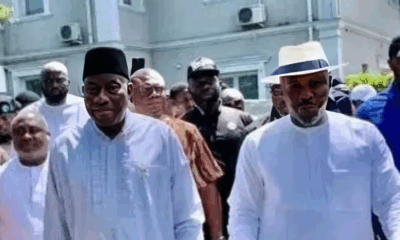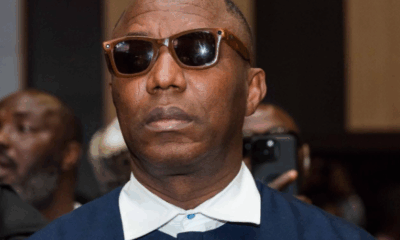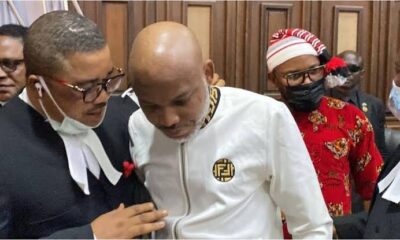Controversial crossdresser, Idris Okuneye, aka Bobrisky, may face new criminal charges over allegations that he served his jail term in a private apartment and bribed officials of the Economic and Financial Crimes Commission (EFCC) to drop money laundering charges against him.
According to The Punch, a panel investigating these claims has recommended that Bobrisky face defamation and criminal charges.
Bobrisky was sentenced to six months’ imprisonment on April 12 for abusing the naira and was released on August 5.
Social critic Martins Otse, aka VeryDarkMan, released a voice note of a conversation allegedly between Bobrisky and another person. In the conversation, Bobrisky claimed to have bribed EFCC officials with N15 million and Nigerian Correctional Service officials to serve his sentence in a private apartment.
The Minister of Interior, Olubunmi Tunji-Ojo, subsequently constituted an investigation panel, chaired by the Permanent Secretary of the ministry, Magdalena Ajani, on September 30, to probe the claims.
The panel, while presenting its report, said there was no evidence that Bobrisky slept outside the Kirikiri Custodial Centre during his six-month sentence.
Details of the report stated that Bobrisky tarnished the image of the correctional service with false claims.
The panel also asked the Department of State Services to investigate whether, directly or through a proxy, he bribed the EFCC or the correctional service.
If the allegations of bribery by Bobrisky are substantiated, the panel said he should be charged with corrupt practices.
“The Nigerian Correctional Service should file defamation suits against Bobrisky under sections 373-375 of the Criminal Code Act for his false claims about bypassing the prison system, tarnishing the institution’s reputation.
“The DSS should be requested to investigate whether Bobrisky, directly or through a proxy, bribed EFCC or NCoS officials. If substantiated, Bobrisky should face charges under the Corrupt Practices and Other Related Offences Act for bribing public officials,” the report partly read.
The panel also indicted four correctional officers who were recommended for disciplinary action as outlined in the NCoS’s condition of service, civil service, and applicable laws.
One of those recommended for sanctions is a former Controller of Corrections, Ben Rabbi-Freeman.
He was accused of “effecting the transfer of Okuneye Idris Olarenwaju without proper documentation of Form 5 and Form 5A from the Medium-Security Custody Centre to the Maximum-Security Custodial Centre on April 22, 2024, after over four months of the transfer date, and after the inmate had ended his imprisonment term; backdating the transfer documentation in relation to 1a and 1b above.
“Causing the in-charge Ikoyi Custodial Centre, in-charge Medium-Security Custodial Centre, and in-charge Maximum-Security Custodial Centre to sign backdated transfer documents in relation to Okuneye Idris Olarenwaju.”
In addition, the Deputy Controller of Corrections who was in charge of the Kirikiri Medium Security, Micheal Anugwa, who claimed during a parliamentary inquiry that he had not been suspended despite an official order from the Minister of Interior, was recommended for disciplinary action.
He was indicted for receiving Bobrisky into the Medium Security Custodial Centre without the relevant documentation on April 12, 2024, and without the necessary transfer documentation.
“DCC Balogun Sikiru (retd) — formerly in-charge of Maximum Security Custodial Centre for receiving Bobrisky into the Maximum Security Custodial Centre without the relevant documentation on April 22, 2024, and without the necessary transfer documentation, and DCC Sikiru Kamoru Adekunle who was in charge of the Maximum Security Custodial Centre for backdating the transfer documentation in relation to receiving of Okuneye Idris into the Maximum Security Custodial Centre on April 22, 2024, which was a period he was yet to resume as the in-charge of the Maximum Security Custodial Centre.”
The panel further recommended an audit of all inmates and detainees in all custodial centres of the NCoS, their warrants, and other records. It asked that a mechanism be set up to do this and sustain it as an effective oversight weekly.
It demanded “decommercialisation of all welfare and support services to inmates with immediate effect and ensuring that adequate funding and oversight are put in place to ensure the continuation of these. This will also include building sustainable partnerships with civil society organisations (example, with relevant NGOs and professional associations) on some or all of these.”
“Facilitate the effective implementation of non-custodial measures across the entire country to help reduce the number of people in custodial centres by utilising imprisonment only as a last resort,” the report added.
- Special Facilities In Custodial Centres
According to The Punch, senior management officer of the NCoS said that what people called VIP treatment for certain prisoners was a special facility that had existed for years.
According to the high-ranking officer, custodial centres have different facilities and prisoners’ conditions (health, age, sex) determine which facility they stay in to serve their jail term.
The officer said, “There are different facilities in the custodial centres across the country, and it is not out of place to treat some of the prisoners according to their health conditions, sex, age, and category of the sentence. Importantly, the prison authority also considers human rights and the treatment of the prisoners.
“The case of Bobrisky is an eye-opener for us. The NCoS authority confirmed that he is a woman from the middle upward, while he is a man from the middle downward. We had never had such a person in our custody, and there is no facility for such a situation. He had to be placed in a separate cell so that he wouldn’t be abused. That facility is what he ignorantly called a private apartment.
“Whether VIP or not, the condition of a prisoner will determine the facility he/she is going to stay in. We can’t put a prisoner who has high blood pressure in a cell without enough ventilation.”
- Activists Make Case For Crossdressers
Okuneye’s case has sparked debate on human rights and recognition of crossdressers, transgenders, and transsexual individuals in the country’s laws, institutions, and facilities.
Some activists, according to The Punch, argued that the government and its institutions should be aware of the presence of these individuals and make provisions for them.
The activists believe that sexual orientation is part of the human rights to be respected by the Nigerian government.
An activist, Femi Adeyeye, said the Kirikiri Custodial Centre where Bobrisky served his jail term was not befitting of his sexual orientation.
Adeyeye urged the Federal Government to respect the rights of individuals regardless of their sexual orientation. He also called on the government to provide special facilities for transgender inmates.
“A special cell for transgender persons is a welcome development; it’s something the government should look into,” he stated.
Another activist, Michael Adaramoye, noted that the Nigerian society had not come to terms with the reality of a growing transgender population.
However, Adaramoye said, “While we must recognise the right of individuals to sexual freedom, as long as it does not infringe on the rights of others, we must also be sensitive to the concerns of other members of society.
He advocated the provision of facilities to accommodate transgender individuals in prisons and cells.
“It is important to note that our correctional centres are organised in a way that dehumanises inmates. Under such vicious conditions, it is difficult for any positive character reform to occur. The prison system in Nigeria is in dire need of deep reform and overhaul,” the activist added.
Also, human rights lawyer, Toyin Taiwo-Ojo, said the Federal Government’s position on homosexuality was ambiguous.
“The Nigerian government must re-evaluate Bobrisky’s detention and consider the long-term implications of their decisions,” she concluded.
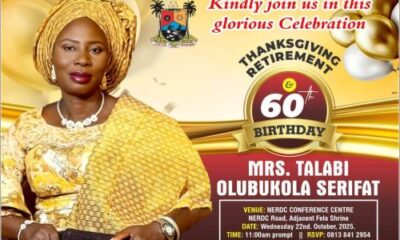
 BIG STORY3 days ago
BIG STORY3 days ago
 BIG STORY3 days ago
BIG STORY3 days ago
 BIG STORY4 days ago
BIG STORY4 days ago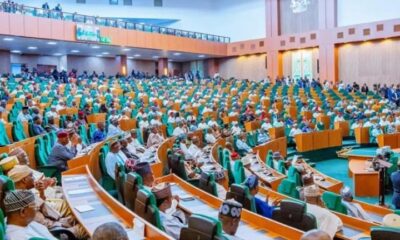
 BIG STORY24 hours ago
BIG STORY24 hours ago
 BIG STORY2 days ago
BIG STORY2 days ago
 BIG STORY3 days ago
BIG STORY3 days ago
 BIG STORY2 days ago
BIG STORY2 days ago
 BIG STORY3 days ago
BIG STORY3 days ago











